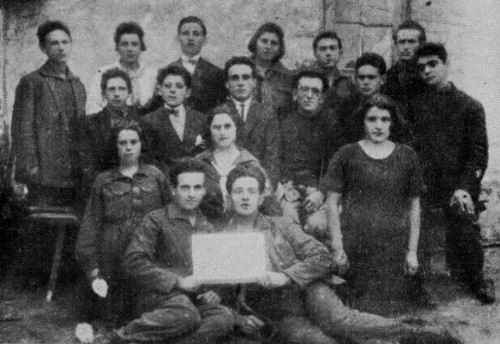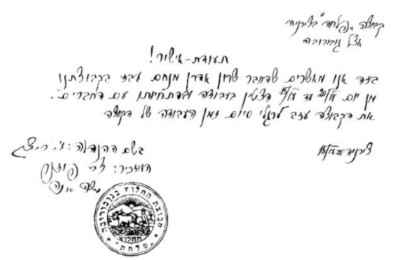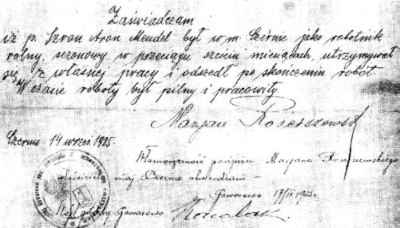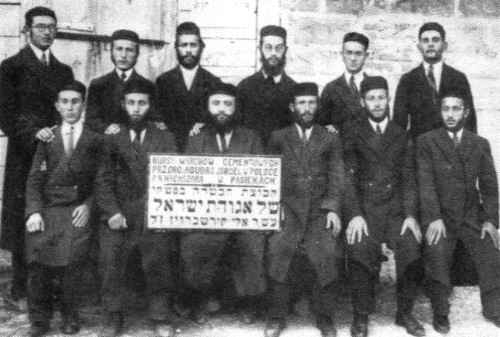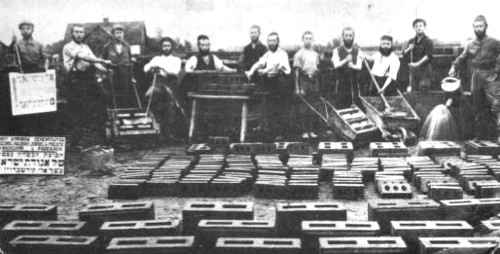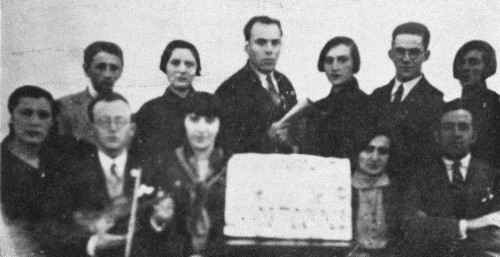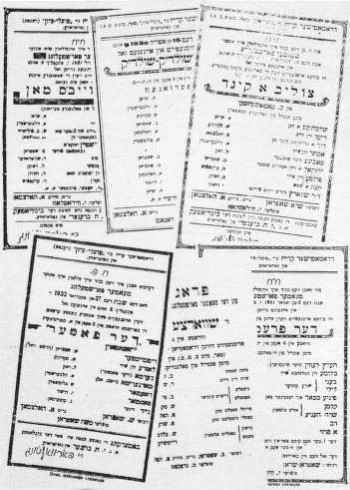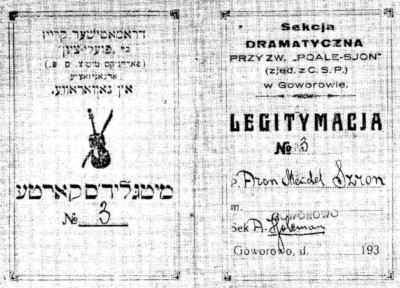[Page 190]
The Agricultural Training Camp “Pulkha” in Tshirnye
by Aron Shron, Israel
Translated by Tina Lunson
Although the Agricultural Training Camp “Pulkha” in Tshirnye only existed for little more than six months, it notes a fine chapter of Zionist work. I will therefore describe here the history of its development and activity up to its dissolution.
It was 1925. We – a group of the Right “Poaley-tsion” -– had just joined the General Zionist Organization. In many members, the idea of making aliye to Erets Yisroel was already ripe. We turned to the “He'khaluts” Center in Warsaw to send a few members for agricultural training. Their answer was negative, as they did not have any free training positions available, but they suggested that we ourselves should create an agricultural training point in our area and they would help us make it so.
We asked the “He'khaluts” Center to send us more candidates. In Goworowo we already had the following: Bunem Shafran, Zelig Hertsberg, Yitskhak Shpitolevitsh (all murdered), Zelig Reytshik (today in Belgium), Meyshe Sarna, Yisroel Kutner, Berl Tsudiker and the writer of these lines (all in Israel).
From the beginning we pushed against financial difficulties. We needed money to purchase various work tools and cooking equipment; and then we had an ingenious idea. At that time, the new building for the study-house was just being finished; Yitskhak Blumshteyn and I went to the town Rov and asked him if he would give us the job of painting it. The Rov agreed. We received 120 zlotych for our work. For that money we could buy the necessary things, and in a few days we were ready to travel.
[Page 191]
|
|
First row, from right: Aron Shron and Zelig Reytshik
Second row: Yente Viernik, Malke Shtern and Garnek
Third row: Berl Tsudiker, Zelig Hertsberg, Tsvi Poyzner, Kalman Kurapotve, Ash and Yitskhak Shpitolevitsh
Fourth row: Yisroel Kutner, Meyshe Sarna, Ester Mandra (from Vishkove), Khaye Blume Vonsiak and Bunem Shafran |
We hired a horse and wagon and we, the above-mentioned eight boys, took the household goods and set out for Tshirnye. I recall that we had a large “procession”. The whole town came out to the bridge to accompany the first pioneers for Pioneering work. Arriving at the place, a disappointment awaited us: The apartment that the Prince had promised was not yet ready; we were left without an alternative and turned to the local blacksmith Reb Borekh Frid (his son Khayim and his family are now in Israel). He put us up temporarily above his smithy shop and his wife cooked a lunch for us. More than once we woke up smeared with soot, with faces like Purim-players. Some of the time we slept in the grain barn on straw, beside the Prince's horses. We greeted all this with love and got up very early to the work in the fields. After ten days our two-room barrack (half sunk in the ground) was ready.
We were in contact with the Central again, reported about our work and asked that they send more people to us. A few days later the following members arrived: from Warsaw, Tsvi Poyzner and Yosef Novina; from Otvotsk, Tsvi Plint; from Vishkove, Ester Mondra (all in Israel); from Mokove,
[Page 192]
Khaye Blume Vansiak; from Ostrolenke, member Ash; from Dlugoshadle, the women members Malke Shtern (today in Israel), Yente and Bernalts Viernik; and the male members Kalman Kuropatve and Holtsman; from Yadove, member Garnek and others. We became a group of 25 Pioneers and could run a good operation. We chose an administration in which our members Zelig Reytshik and Meyshe Sarna were involved. Tsvi was elected as secretary. He was an intelligent young man, knew Hebrew well and had already done practical agricultural work (he came from Russia). We were also already doing cultural work, learning Hebrew, conducting member discussions, making a small library and so on. And the Center sent out more people from time to time who presented lectures.
Each day another daily pair (a boy and a girl) was designated, whose assignment it was to keep the residence in order, cook and bring breakfast to the members in the field. Three times a week the daily pair was given a horse and wagon by the Prince, and they traveled to Goworowo to buy products such as meat, bread and other necessities.
During this time we became accustomed to the hard physical work. We cut the grain, hay and handled the separators. Three men from our group – Hertsberg, Shpitolevitsh and I – went into the woods and cut down large trees, loaded them onto wagons and brought them to the estate with horses. We were taught how to handle the Prince's horses. The estate manager was pleased with us. Indeed, we did no worse than the Christians at the work.
The non-Jewish workers tried to scare us, saying that when it came to the “cutting” we would not be able to handle it and would run away, because standing the in the field the whole day and cutting wheat is hard labor. But we had the strength for that too. Some of us went through a short course in cutting with the scythe and quickly grasped the rules of it. The Christian workers kept us specially in their midst during the cutting to keep us in place. Other members then were occupied with gathering the cut wheat, binding it in sheaves and standing them in rows for drying. That was also not light work. We did it all with industry and will, knowing the goal, and to see that everyone can work.
The order of the day was full to overflowing: Up to go to work at dawn. After working for two or three hours, the pair on duty brought us breakfast. For lunch we came back to the house to eat and rest a little. At sunset we ended work and came back home. After washing and a little rest, and after the evening meal, we had a lesson in Hebrew. Then a general discussion, singing and dancing. From time to time some
[Page 193]
friends came for an evening, as for a Shabes. We were free to go to the town to visit the family and friends. Besides that, almost every Shabes, some friends from Goworowo visited us.
The group “Shomer Shabes” from Goworowo decided to hold oversight of us over kashrus. Right on the second Friday, as we were just back in our own “apartment”, Reb Yesheyahu Hertsberg may God avenge his blood paid us an official visit. He was staying with the Frid family, and we were observing Shabes faithfully and properly. We all welcomed the sabbath, made kidish, sang zmiros and ate a Shabes feast, with fish and all the other dishes. Of course, he also visited our kitchen, inspected the meat and dairy utensils and expressed his satisfaction.
A month later Reb Avrom Shafran may God avenge his blood came to visit for a Shabes. He was with us, eating the cold dishes with us (we did not have any tsholent to serve), and in the evening he went back home. Also, my father Reb Yisroel Yitskhak may God avenge his blood visited us often. But, in order to spare him any unnecessary trouble, I asked him to come during the week. After returning from such a visit, he paid personal visits to the parents of the Goworowo Pioneers, to tell them that he had checked and that everything was in order. We did indeed observe kashrus and avoided as far as possible desecrating the Shabes, so that our observant parents would not have any unnecessary anxieties. It was a fact that even in the midst of “cutting season” we took Shabes rest.
On L”g b'oymer we got a vacation from the Prince. We used it and went through the forest on foot to Dlugoshadle. We attended a concert there that evening
|
|
| A certificate for our settlement after finishing the agricultural training |
[Page 194]
(we had members with artistic abilities) and the town took us in with great enthusiasm.
After working for half a year, our agricultural course ended, and we received the appropriate certifications from the Prince. A member came down from the “He'khaluts” Center, conducted examinations among us and gave testimonials to a number of members, so they could then make aliye. It is worth noting, that not all could sustain the heavy physical work and had gone back home after a while.
The agricultural kibuts in Tshirnye was then liquidated and we shipped the whole inventory (tools, utensils, dishes, books) to the Center in Warsaw, along with about 100 zlotych that we had managed to save up.
Because of the opposition from his parents, Meyshe Sarna did not travel to Erets Yisroel. And I could not make aliye because I was called into the Polish military service, where I stayed for two and a half years. When I came back and inquired at the “He'khaluts” Center for my certificate, they refused it and told me to go to agricultural training again. I refused and went to my sister in Ostrov-Mazowiecki, where I became active in the party “Poaley-Tion” Zionist Socialists and in the dramatic circles. In 1930 I went back to Goworowo and continued my activities in the movement and in the dramatic circles. In August 1932 I finally made aliye, along with my wife Devore and others who also used the [tourist] excursions to the “Makabi” games in Erets-Yisroel.
|
|
| Certificate from the Tshirnye Prince Rashtshishevski after completing the agricultural training.
His signature was confirmed by the village mayor Karolak with the stamp from the community council. |
[Page 195]
The Preparatory Training Point in Pasheki
by Leyvi Varshaviak, Israel
Translated by Tina Lunson
The preparatory training group named after the famous Aguda leader and Sejm deputy Rov Eli Kirshboym, in Pasheki, was created at my initiative in 1934. Twelve members of the “Agudas Yisroel” in Poland took part in that Pioneer colony, including the following four members from Goworowo: the writer of these lines as founder and chairman, Meyshe Mozes, Yosef Tehilim may God avenge his blood, and Meyshe Galant of blessed memory.
The work-place for the training was in a concrete factory at the train station in Pasheki, that fashioned blocks, sidewalk tiles, water pipes for wells and so on, and belonged to the Goworowo proprietor Reb Mayer Volf Tehilim. The goal was that the training members would learn the concrete trade, which at that time was extremely useful in Erets Yisroel.
The members worked eight hours a day in the factory, after which they spent time as a community, prayed as a group, studied Torah lessons and listened to readings about various topics.
I personally participated in the training for only four months. I was ousted by the “Palestine Office” in Warsaw because of a certain injustice by the son-in-law of Mayer Posheker, who willfully reported to the “Palestine Office” that I left the training each Thursday in order to trade in the marketplace.
The best lie is a half-truth. It was, truly, a correct assertion because I used to travel each Thursday to Goworowo to the market to purchase food products and other needed things for the training point. But the inspectors from the “Palestine Office” who came to Pasheki on a certain Thursday and did not find me there, did not comprehend the motive and ousted me from the training. I went on to another training point near Warsaw.
Of those at the Pasheki training there remain only two members, myself and Elkhonen Lubart, who lives in Kriat-Motseki.
I will take this opportunity to provide a few moments from my community activities in Goworowo. I would like to list to my credit the founding of the “Beys-Yankev” school, for which I was almost the only one standing by the cradle at the founding. I will only mention the huge assistance of the town rabbi
[Page 196]
Rov Alter Meyshe Mordkhe Burshtin may God avenge his blood, and of the Rebitsn Ginendl of blessed memory who devoted much time and energy to the school and produced financial help; and thanks to them the school could develop and bring about an intellectual revolution in the town. The enthusiastic assistance of many of the town's Jews came later. It was from the “Beys-Yankev” school that the youth organization “Basye” was created as well as “Banos Agudas Yisroel”.
|
|
The training group with Leyvi Varshaviak in the center
On the left: Meyshe Moses and Meyshe Galant of blessed memory
Standing above on the right: Yosef Tehilim may God avenge his blood |
I had many helpers in the broadening of the Ger“shtibl”. When I arrived in Goworowo the Ger minyen was in a private residence at Velvl Blumshteyn's. After a completed action a space was rented at Yankev Shtshetshina's, and after that, with the help of Rov Burshteyn may God avenge his blood, they built their own building.
The “Tseirey Agudas Yisroel” organization, which numbered about 30 to 40 members soon after its beginning, was founded at my initiative. The founding council consisted of the following five members: Leyvi Varshaviak, Yitskhak Shafran, Avrom Yisroel Trushkevitsh may God avenge his blood, Tsvi Rubin of blessed memory, the candy-maker and Khayim Kosovski may God avenge his blood. I was also elected as representative from “Agudas Yisroel” to the administration of the town “Gemiles khesed” fund.
After my aliye to Erets Yisroel in January 1936, I also stayed in close contact with Goworowo Jews, and was always curious to know that was happening there.
[Page 197]
|
|
The training group at work
The Goworowo members in the picture are: Leyvi Varshaviak (third from left), Meyshe Mozes (fifth from left),
Yosef Tehilim may God avenge his blood (second from right) and Meyshe Galant of blesses memory (fifth from right) |
[Page 198]
The Drama Circles
by Avrom Holtsman, Israel
Translated by Tina Lunson
The first performances in Goworowo began with the cantor Yosef Khayim, who lived in the town just before the First World War. The older generation remember him well, the merry cantor with his group of “performers”. They performed on the days of Purim, with gay little songs and various artistic skits, and went around from house to house for little gifts of food or money. The money was given exclusively to benevolent ends, like the Passover fund, the fund for poor brides, the poor house and others. Later when the number of needy people multiplied, and they could no longer wait from Purim to Purim, they performed at every wedding. They sang, imitated various types of people and otherwise entertained the guests. They showed how a Cossack would chat with a Jewish elementary school teacher, with a little Russian, a little Polish and of course a little Yiddish. This brought out a lot of laughter from the audience who were happy to toss contributions into the charity box.
After the First World War there were already modern performances coming to the town. They played pieces in an appropriate venue with scenery, with make-up and sets. In those days, Meyshe Bengelsdorf (Ester Malke's son) came from Russia, where he had completed an acting school. He performed in Goworowo with a group of amateurs, to great success. For a few years there was also a youth choir under the direction of Meyshe Brukhanski (a younger brother of cantor Malkiel). He was a good cantor and singer, and the choir had many public performances.
In 1922 the play “Di shekhite” by Yankev Gordin was performed with the participation of Binyumin Ginzburg, Yekhiel Pshisusker, Peysakh Trukhnovski, Eydel Levitan, Dovid Glagover, Feyge Feyntsayg and others. Other performances were also presented. The revenue was designated for the library at the Zionist organization. Various evenings of entertainment with artistic programs were also arranged for the same goal. For the 11th of Oder, they also produced the one-act play “Der shoymer” by Z. Vidervisht; “A doktor – a soykher” by Sholem Aleykhem, with the participation of Sore Gemora, Avrom Romaner and others.
[Page 199]
The number of amateurs increased during that time; and their artistic abilities developed. We had our own director, a make-up technician, a parody writer, a promoter and so on.
In 1926, the acting troupe Shitarski–Brofman–Noyman arrived in Goworowo from Warsaw. The Zionist Organization made an agreement with them, that they would help with technical and human resources and so receive a certain amount of the revenue. Under their direction we then put on “Di rumenishe khasene”, “Vu zenen mayne kinder”, “Der dybbuk”, “Der greyser moment”, “Di shvartse khofe” and “Khashe di yoseyme”, which went off with great success. Our local resources who took part: Bunem Shafran, Leybl Kersh, Aron Shron, Avrom Holtsman, Simkhe Zilbershteyn (promoter), Sheyndl Karlinski, Sime Shakhter, Sime Potash and others.
|
|
The drama circle of the Right “Poaley tsion”
First row from right: Aron Shron, Blume Fayntsayg, Sore Sklornik, Avrom Holtsman and Reyzl Shniadover.
Standing: Sime Potash, Shmuel Blumshteyn, Sime Shakhter, Meyshe Granat, Nekhe Reytshik and Yehude Grudke. |
After a short while, the hairdresser Yosl Zilbershteyn from Pultusk arrived in Goworowo. He was a young man with artistic and organizational abilities and could also direct and do make-up. He created a non-party drama circle of the earlier-mentioned people and of Meyshe Dovid Malovani, Feyge Shetsekh, Leybtshe Gemora, Kalman Klepfish and Khaye Zilbershteyn. That troupe, under Silbershteyn's direction, put on “Devorele meyukheses”, “Di farblondzshete neshome”, “Hertsele Meyukhes” and others.
But this idyll did not last. A split took place in 1929, which I caused. The story was during Purim 1929,
[Page 200]
while we were performing the play “Der batlan”. I was playing the role of the teacher Bronin, a Bundist, also a sympathizer with a wealthy man's daughter. When it came to the words that Bronin says “If Zionism possessed no more than that one merit, which a person like you does not have, then that alone would be worth being a Zionist…”, I added a few words, in keeping with Purim, “and traveling to Erets Yisroel and not looking at a ninny like you…”. Well, that started a huge uproar. Yosl Zilbershteyn reacted from behind the scenes. He demanded me – because there were also many Bundists among the audience – to publicly apologize for conducting agitation for traveling to Erets Yisroel – and right now in the middle of the play, or else he would stop the production. Although I did not consider my deed to be criminal, I agreed to apologize, but after the end of the play. Because of the fact that the entire revenue was designated for the fund for the poor at Passover, I did not want to become a subject of mockery. After the play I did indeed come back to the stage, but instead of apologizing I came out with the announcement that a new drama circle was being formed at the Brener Library, and that I had made that declaration on my own responsibility and without consulting the other members. Some of them scolded me for “burning the pudding”, others supported me. But all the same, how could I come up with a play and then have it prepared in such a short time?
But then an ingenious idea came to me: At the “Skala” Theater in Warsaw they were playing “Gebrokhene hertser”. Thanks to my acquaintance with a collaborator at the “Haynt” newspaper, I was able in get a copy of that script – already censored by the Polish ministry of education – and brought it back to town with me. We immediately distributed the roles and began to act it out. Participants were Bunem Shafran, Aron Shron (also Dezshi), the writer of these lines (in the main role of Avigdor and Grim), Shmuel Blumshteyn, Dovid Khetsron, Blume Fayntsayg, Nikhe Reytshik, Reyzl Shniadover, Alte Zilbershteyn, Sime Shakhter, Sime Potash, Sore Skurnik, and others. The piece was produced with much moral and material success. With that revenue with rented a large venue for the party (“Poaley tsion” Zionist Socialists) with the Brener Library, at Fayvl Shron's.
Later, Aron Shron was successful in bringing the piece “Umshuldik shuldik” from Ostrov Mazieki, which he taken a part in there. That piece was presented in our own venue, during Peysakh week 1930. We produced that play several times, and people even came from the surrounding area to see it. After that we played “Der fremder”,
[Page 201]
|
|
| Invitations, announcements and programs from the theater presentations
produced by the drama circle of the Right “Poaley tsion”. |
[Page 202]
by Yankev Gordin on January 31st, 1931, “Tsulib a kind”, by Rikl Shlumke, 28 February 1931.
At that time, some artists from America were playing guest roles in Warsaw and had great success in staging “Zayn vayb's man” (“Seme Lets”). I was able to bring the play down to Goworowo and a few times it played with me in the main role of Seme Lets. Leye Rozen and Malke Tsalke also took part in play.
We went from success to success. We later produced “Di brider Luria”, “Di shtif-muter”, “Di Royber” by Fridrich Shiller, “Der feter” by Staynberg, and others. We also presented one-act plays, sketches, monologues, recitations and so on. All the revenues went to purchase books for the Brener Library.
That lasted until the end of 1932, when our main amateur artists got married and moved away, the majority making aliye. We could not produce any more shows. So we arranged for khanike that year, a grand ball with an artistic program: “Humorous Newspaper”, sketches, parodies and so on, which were in the main directed by myself.
After the above-mentioned split, Yosl Zilbershteyn had organized his drama circle anew, but now under the shingle of the Perets Library of the Bund. Over the years they staged “Got fun nekome” by Sholem Ash, “Der Toyber” by Dovid Bergelson, “Tsvishn tog un nakht” by Sh. Anski, “Hersh Lekert” by H. Leyvik, “Afn altn mark” by I. L. Perets, “Der dorfsyung”, “Afn veg to Buenos Ayres”, “Di konspirative dire” and others. All of those productions were carried off with great success. Participants were Tsipora Khetsron, Sheyndl Karlinkski, Mashe Molovani, Leybtshe Gemora, Yisroel Shafran, Leyb niks, Khane Olek, Libe Gemora and others. For a time Rokhl Gemora helped with the rehearsals and promotion.
Besides those described, drama circles also existed in smaller forms in other places. The “Beys Yankev” school had an active drama circle of only girls, who also played the male roles. At the end of the school year they also gave performances on historic themes. They presented “Makires Yosef”, “Meylekh Akhashveresh”, “Shimshon un Dlayle” and others. The performances were given in the women's shul or in a barn at the Rozen-Kosovski lumber yard or other places. Their presentations were well-attended.
The “Ha'shomer ha'tsair” produced ”Ha'khutfim” (Cantonists) in Meyshe Tenenboyms's hall, with Nekhe Shakhter, Elieyzer Levin and Shleyme Apelboym in the lead roles. They also performed several one-act plays.
[Page 203]
Almost every year on the 11th of Oder, “Betar” also mounted pictures, enactments and other artistic performances that were connected to the memory of Yosef Trumpeldor.
It is worth mentioning that the largest number of presentations in town were presented in Meyshe Dronitsa's barn.
|
|
| Membership card for the drama circle of the “Poaley tsion” Zionist Socialists. |
[Page 204]
The Work of the National Funds
by A. Sh. Menakhem, Israel
Translated by Tina Lunson
Keren kayemet l'Yisroel
The work of the K.K.L. was carried out by all the Zionist parties. In that work all the party bickering and political discussions disappeared. The sole common goal was to create more money for the Fund.
The main revenues for K.K.L. came from the blue-and-white pushkes, charity boxes. The town was divided into three regions, and each month a different party was assigned another region to empty the pushkes. That system was instituted in order not to do anyone injustice, since not all the regions brought in the same amount. That job was done mostly by the youth.
Besides the donations made for aliyes to read Torah by the Zionist-disposed congregants, we also carried out “flower” collections at weddings and other celebrations. From time to time we had various inter-party presentations, whose revenue went exclusively to the K.K.L.
The work of the K.K.L. was very intensive, Each party had to try to produce more money. At the first places of collection, the “Betar” and “Ha'shomer ha'tsair” stood x in the almost the same proportion as the population, and the Goworowo Jews reckoned as the biggest collectors and donators. At the K.K.L. Central in Warsaw, our town took a prominent place.
[Page 205]
For especially large events, the main office of the K.K.L. sent out speakers to us, which mostly took place in the large study-house, with speakers on the topic of the day. We were visited by Pinkhas Fogelman, Avrom Bialistotski, Yekhiel Frenkl, Tenenboym and others. The council of the K.K.L. consisted of party-delegated members. For a log time the following members worked there: Meyshe Dranitsa (General Zionist), Yitskhak Viroslav (P.Ts-Z.S.), Meyshe Granat (He'khaluts), B. Kosovski (Betar), Hershke Granat (Ha'shomer) and others. Later others were active: Avrom Holtsman, Avieyzer Shikora and others. For many years the head of the K.K.L. was Dan Rozenberg, the last leader was Shmuel Tsudiker. Both belonged to “Mizrakhi” and were voted in unanimously.
Keren ha'yesod
The work of Keren ha'yesod became unstable, and it was not an official committee anyway. The administration of Keren ha'yesod was connected to larger sums of money and the larger part of them could not be allowed. From time to time though, they produced very important events. Then, the Central Keren ha'yesod in Warsaw would send special messengers who gave lectures in the large study-house and explained to the audience the importance of the undertaking. From those declared sums we could underwrite promissory notes for longer terms. During those special events we were visited by Asher Kolodny, Rov Hogar and others. About the importance of the national funds, we often heard lectures in the study-house from the hospitable speaker and “Mizrakhi” leader Meyshe Skurnik.
The Zionist youth organizations rarely took part in the action for Keren ha'yesod. Only the adult members of the parties were active; they were well-known activists who were among both the collectors and the donors.
This material is made available by JewishGen, Inc.
and the Yizkor Book Project for the purpose of
fulfilling our
mission of disseminating information about the Holocaust and
destroyed Jewish communities.
This material may not be copied,
sold or bartered without JewishGen, Inc.'s permission. Rights may be
reserved by the copyright holder.
JewishGen, Inc. makes no representations regarding the accuracy of
the translation. The reader may wish to refer to the original material
for verification.
JewishGen is not responsible for inaccuracies or omissions in the original work and cannot rewrite or edit the text to correct inaccuracies and/or omissions.
Our mission is to produce a translation of the original work and we cannot verify the accuracy of statements or alter facts cited.
 Goworowo, Poland
Goworowo, Poland
 Yizkor Book Project
Yizkor Book Project
 JewishGen Home Page
JewishGen Home Page
Yizkor Book Director, Lance Ackerfeld
This web page created by Jason Hallgarten
Copyright © 1999-2025 by JewishGen, Inc.
Updated 10 Jul 2024 by JH
